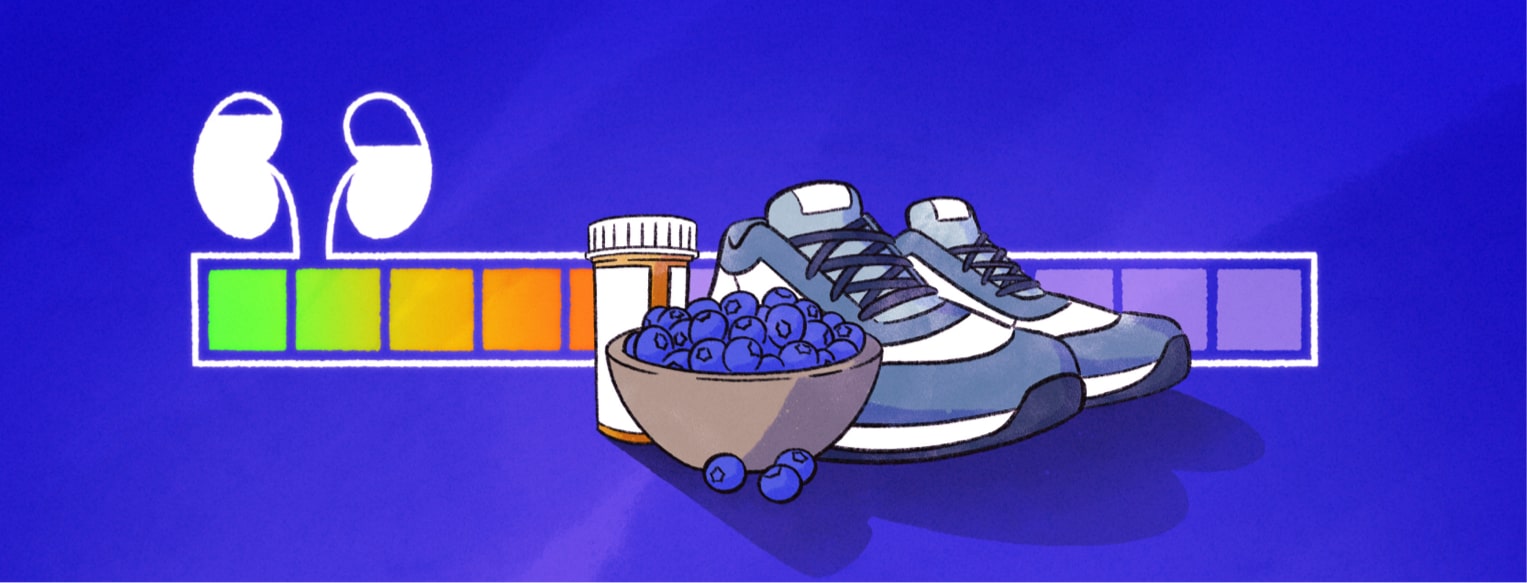Slowing the Progression of Early-Stage Chronic Kidney Disease
If you have early-stage chronic kidney disease (CKD), there are ways to help control the condition. While you cannot stop the progression of CKD, studies show that you can slow it down.1-4
As in any strategic game, you can play offense. You can make healthy living choices to help your kidneys function with less stress. This can reduce the rate of CKD damage. You can also play defense. As your doctor advises, you may take medicines that help your body deal with the effects of kidney damage.1-4
What happens to kidneys in early-stage CKD?
Your doctor has probably told you that CKD has 5 stages. In stage 1 and 2, your kidneys can mostly do their job of removing excess fluid and waste from your blood. The main difference between these two stages is how fast your kidneys can filter your blood over time. Your doctor can measure this rate and identify the level of damage CKD has caused.1,5,6
In stages 1 and 2, you may have few or no symptoms. But you may have:4,7,8
- High blood pressure
- Urinary infections
- Protein in your urine
- Small amounts of blood in your urine
- Puffy eyes, hands, feet, and legs
As CKD advances to stage 3, you may have more obvious effects. In addition to the symptoms listed above, you may experience:4,7,8
- Needing to pee more or less than usual
- Darker-colored pee
- Foamy pee
- Itchy skin
- Lower back pain
- Muscle weakness or cramping
- Depression
What healthy living choices can help kidneys work better?
Since your kidneys are one of your body’s waste removal systems, CKD disrupts your body’s balance. But how you eat and live can help preserve that balance. Proper diet and exercise can buy you time.
Diet
The main principles of a “kidney-friendly” diet for people with early-stage CKD are:1-4,7
- Limit protein. Filtering protein is hard work for your kidneys. Over time, this work weakens damaged kidneys.
- Limit sodium. Sodium (salt) helps your body balance fluids, but it is tough for your kidneys to filter. Limiting your sodium intake decreases the strain. It also helps control your blood pressure and prevent swelling.
- Eat fresh foods. Fresh foods provide your body with fuel, energy, and much-needed nutrients. Shop the outer rim of the grocery store to find fresh vegetables, fruits, meat, eggs, and bakery items.
- Cut out fast food and processed foods. Fast food and processed foods often have large amounts of sodium and phosphates. Weakened kidneys struggle to process phosphates. When phosphates remain in your blood, they trigger calcium loss from your bones. This can cause bones to break easily.
- If you are diabetic, control your blood sugar. Uncontrolled blood sugar levels can damage your kidneys.
Exercise
Exercise benefits just about everybody. It is no different for people with CKD. Almost any form of brisk activity will help your body cope with the effects of the disease. This may include:
- Walking
- Swimming
- Dancing
- Biking
Exercise can also help you reach and stay a healthy weight, further reducing the strain on your kidneys.2,4,5,8
Sticking to these guidelines
Following these guidelines may seem like a tall order. But it is okay to ask for help. For example, your doctor can suggest a CKD nutritionist. This person can be a great ally, designing the best diet for your specific stage of CKD.1,3-5,8
The internet has many good websites that list diet plans for CKD. Some list kidney disease cookbooks, online recipes, and tips for reading labels. Also, there are many useful phone apps that track your food and its ingredients.3,9,10
What medicines can help combat my CKD?
Certain medicines can reduce or prevent CKD symptoms. These may include:1,4,5
- Drugs to lower your blood pressure (angiotensin-converting enzyme inhibitors or angiotensin receptor blockers)
- Drugs to remove excess water (diuretics)
- Drugs to thin your blood and improve blood flow (blood thinners)
- Cholesterol-lowering drugs (statins)
Work with your doctor to make a medicine schedule. Follow it closely, and report any side effects to your doctor.1,4,5
What is the takeaway?
CKD usually affects your body slowly over time. In early-stage CKD, those effects are less noticeable. But acting now will help. Ask your doctor and a CKD diet expert to help you create a plan for decreasing your rate of kidney damage. Take targeted medicines as prescribed. Armed with facts and determination, you can live well with early-stage CKD.1-4

Join the conversation